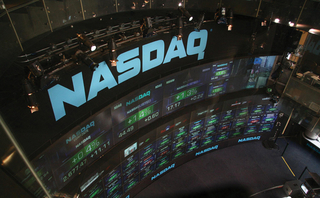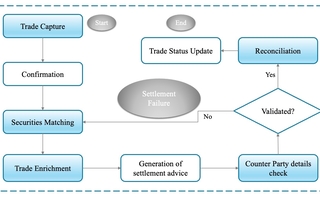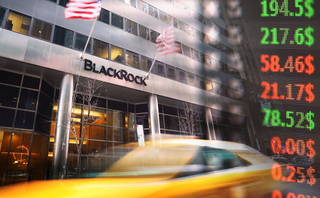Deutsche Börse seeks seat at tech leader table with SimCorp buy
With exchanges such as Cboe, Nasdaq, LSEG, and ICE leading the pack of exchanges that double as technology companies, the German exchange is playing catch up with its proposed offer for buy-side tech vendor SimCorp.
87bf.jpg)
It’s hard to resist an underdog story. And Deutsche Börse, as the operator of one of the largest stock exchanges in the world, isn’t your typical example. But with its recent offer of $4.3 billion for Danish trading technology vendor SimCorp, the German exchange finds itself seeking a seat at a table already occupied by tech-forward exchanges such as Cboe Global Markets, Nasdaq, the London Stock Exchange Group (LSEG), and the Intercontinental Exchange (ICE). But are there enough chairs? And is dinner almost over?
A spokesperson for Deutsche Börse calls SimCorp the “missing link in our value chain,” adding that the addition of SimCorp, should it be accepted by the vendor’s board, will further the exchange’s operations in portfolio management, trading and execution systems, accounting, and post-trade.
The potential acquisition comes at a time when global exchanges are reframing themselves, from mere marketplaces where the quality of matching engines determines everything, to something like one-stop shops with service suites and standalone products that can satisfy countless use-cases. And many of them—including Deutsche Börse—have inked deals with major cloud providers to supercharge these efforts.
But cloud remains only a piece of the overall puzzle for these self-regulatory organizations. The deeper and broader their data and analytics offerings can go, the higher the promise of market share. As the data and analytics universe has exploded over the better half of the last decade, some have gotten a head start—and others, such as Deutsche Börse, will have to play a smart game of catch-up to stand tall among giants.
Keiren Harris, co-founder of MarketData.Guru, a market data strategy consultancy, says that Deutsche Börse’s current breadth and depth of trading solutions falls short of some of its competitors. Refinitiv, for example, brought established post-trade solutions to LSEG, in addition to market data. Nasdaq and ICE, similarly, cover the complete trade workflow. And in terms of indices, STOXX, Deutsche Börse’s index provider, isn’t exactly comparable to a leading index provider like FTSE Russell, but it compares well to Nasdaq, he says.
Still, Harris expects SimCorp to add plenty of value to the exchange’s offering through the vendor’s ability to generate data, its client roster of buy-side shops, and its post-trade services.
In return, SimCorp gets deeper pockets to fund innovation efforts and the ability to cross-sell its products to a larger client base who have a range of needs from the front to back office.
“[Deutsche Börse] stopped at execution to a great extent,” Harris says. “With increased direct market access, there is an emphasis on operational service and taking SimCorp’s solutions and associated analytics deeper into financial institutions. These all require data.”
While not a technically a data company, as a hardcore trading technology provider, there’s plenty of data flowing through SimCorp’s various front- to back-office systems, with an emphasis on the buy side.
In a statement announcing the offer, Deutsche Börse said that it plans to combine SimCorp and its existing properties, analytics firm Qontigo and ESG data provider ISS, which are part of its Data and Analytics segment, into an investment management solutions group—a heady play to establish itself as a vendor-of-choice among asset managers, hedge funds, and other buy-side firms specifically, says a source familiar with the details of the ongoing deal.
“Deutsche Börse is looking at creating an investment management platform—it’s an area that they don’t have strong domain expertise in.”
The source adds that while Deutsche Börse has Qontigo for the performance and risk side of the business, and Clearstream for settlement, there was a SimCorp-sized hole in the front-to-back portfolio management investment department.
“SimCorp has always been very strong in the accounting space,” adds a head of buy side at an enterprise data management provider. “SimCorp were the last independent, front-office, back-office service provider left. State Street acquired Charles River; Aladdin has already been captured by BlackRock. So, since they were the only ones left, [the offer] wasn’t surprising.”
Growing pains
For a seemingly promising acquisition that aims to fill gaps in Deutsche Börse’s coverage, some sources spoken to for this story pointed out potential headwinds and obstacles for the exchange group. First, there’s the timing of the play, which arrives during a period of “softening valuations” in the marketplace, says the head of buy side.
Beyond that, the buy side remains a notoriously difficult demographic to capture. They’re often deeply entrenched in their legacy systems, have smaller budgets to play with, significant compliance requirements, and, not least, are nowhere near as homogenous in profile as their sell-side counterparts.
David Toomey-Wilson, director of sales and business for Grandview Analytics, worked at SimCorp for a brief period between 2019 and 2020, joining when the Danish outfit acquired his previous company, AIM Software, which catered exclusively to buy-side shops. He believes that Deutsche Börse’s move for SimCorp is reflective of a wider development affecting exchanges, where the more enlightened players are becoming more aggressive on data.
“They need to get part of it. Everything is a platform now—it’s becoming a platform play,” Toomey-Wilson says. “Everybody’s seeing the success of BlackRock Aladdin and things like this. If you think about it, are they all going to morph into something that looks the same, and there will be about a half-dozen different players?”
He answers his own question: “I’m not sure whether that’s a good thing for the industry or not.”
Toomey-Wilson adds that while Deutsche Börse is not at the same level as the giants in the tech-forward exchange field, “they’re no pygmies either,” and executives at the well-funded, well-respected exchange group wouldn’t undertake a transformation project if they didn’t believe they were capable of succeeding.
It takes time
Catherine Clay, Cboe Global Markets’ global head of digital and data solutions, knows well the time, planning, and wherewithal that goes into integrating companies into an exchange group and in creating new business units.
Clay, who was responsible for overseeing Cboe’s triple acquisition of Hanweck, FT Options, and Trade Alert in 2020, told WatersTechnology last year the integrations had been completed, and the trio of companies had been combined with two prior acquisitions, LiveVol (2015) and Silexx (2017), into a new, rebranded division called the Risk and Market Analytics Group.
In other words, there have been nearly eight years between Cboe executives’ realization that it had some service gaps it should really look to fill and the moment that industry participants would hold it up as an example for other exchanges looking to do the same thing.
However, she cautions against drawing any conclusions that Cboe is somehow finished with transforming itself. “At this point, we have a lot to attack, and our clients are asking more and more of us, not less,” she says. “Now that we have this platform, we have more to do than ever before.”
Cboe’s secret to its success though, says Clay, has been that it hasn’t strayed from its core strengths, despite its efforts to diversity itself. For Cboe, that looked like doubling down on risk and volatility—inherit features of the options world, from which the exchange takes its name.
Likewise, Nasdaq has carved out a niche in market surveillance and financial crime monitoring. ICE has found a home in fixed-income data and analytics. And LSEG jumped to the front of the sell-side market data world with Refinitiv.
Sources interviewed for this story say they expect to see the deal approved by SimCorp’s board. It’s possible, with that sign off, Deutsche Börse will begin its own mission to become the buy side’s new darling of front-to-back investment platforms.
Further reading
Only users who have a paid subscription or are part of a corporate subscription are able to print or copy content.
To access these options, along with all other subscription benefits, please contact info@waterstechnology.com or view our subscription options here: http://subscriptions.waterstechnology.com/subscribe
You are currently unable to print this content. Please contact info@waterstechnology.com to find out more.
You are currently unable to copy this content. Please contact info@waterstechnology.com to find out more.
Copyright Infopro Digital Limited. All rights reserved.
You may share this content using our article tools. Printing this content is for the sole use of the Authorised User (named subscriber), as outlined in our terms and conditions - https://www.infopro-insight.com/terms-conditions/insight-subscriptions/
If you would like to purchase additional rights please email info@waterstechnology.com
Copyright Infopro Digital Limited. All rights reserved.
You may share this content using our article tools. Copying this content is for the sole use of the Authorised User (named subscriber), as outlined in our terms and conditions - https://www.infopro-insight.com/terms-conditions/insight-subscriptions/
If you would like to purchase additional rights please email info@waterstechnology.com
More on Trading Tech
For MarketAxess, portfolio trading buoys flat revenue in Q3
The vendor is betting on new platforms like X-Pro and Adaptive Auto-X, which helped forge a record quarter for platform usage.
Quants look to language models to predict market impact
Oxford-Man Institute says LLM-type engine that ‘reads’ order-book messages could help improve execution
JP Morgan pulls plug on deep learning model for FX algos
The bank has turned to less complex models that are easier to explain to clients.
Nasdaq says SaaS business now makes up 37% of revenues
The exchange operator’s Q3 earnings bring the Adenza and Verafin acquisitions center stage.
Harnessing generative AI to address security settlement challenges
A new paper from IBM researchers explores settlement challenges and looks at how generative AI can, among other things, identify the underlying cause of an issue and rectify the errors.
The causal AI wave could be the next to hit
As LLMs and generative AI grab headlines, another AI subset is gaining ground—and it might solve what generative AI can’t.
Waters Wrap: Operational efficiency and managed services—a stronger connection
As cloud, AI, open-source, APIs and other technologies evolve, Anthony says the choice to buy or build is rapidly evolving for chief operating officers, too.
BlackRock forecasts return to fixed income amid efforts to electronify market
The world's largest asset manager expects bond markets to make headway once rates settle.







